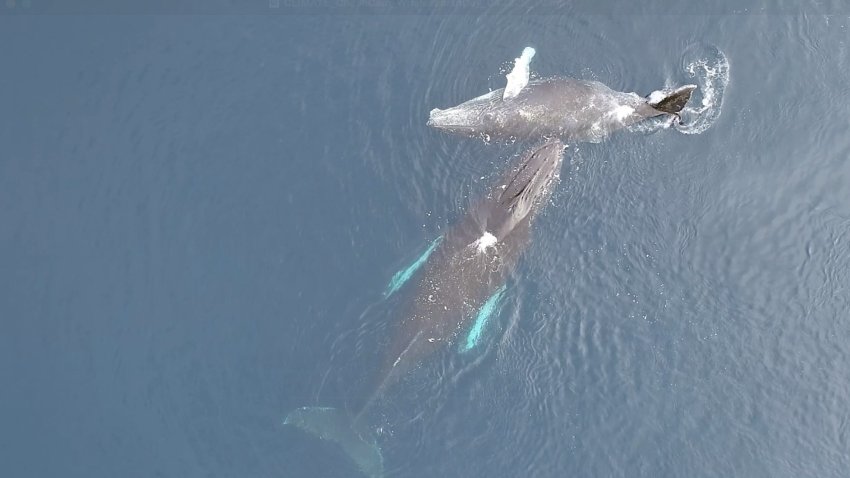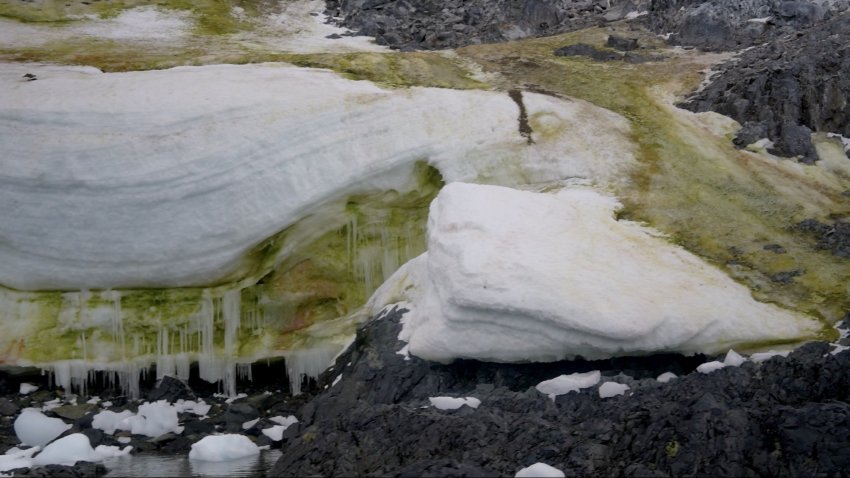-

Amid federal research cuts, some Antarctic tourist cruises are sponsoring scientists
Wealthy adventurers and bucket listers rub shoulders with scientists looking to gather data as funding vanishes under the Trump administration.
-

Can ecotourism fill the void with drastic cuts to science funding?
As the Trump administration continues slashing budgets of groups like the National Science Foundation, scientists may increasingly need to rely on private tour companies for their research. In contrast, global research shows 74% of Americans want our leaders to do more to address climate change. Meteorologist Chase Cain traveled to Antarctica to explore how ecotourism could help persuade climate skeptics...
-

World's biggest companies have caused $28 trillion in climate damage, study estimates
A new study estimates that the world’s biggest corporations have caused $28 trillion in climate damage.
-

84% of the world's coral reefs hit by worst bleaching event on record
Harmful bleaching of the world’s coral has now grown to include 84% of the ocean’s reefs in the most intense event of its kind in recorded history.
-

It's raining more in the coldest place on Earth — and that's bad for penguins
Penguin chicks, whose coats are made of fluffy down feathers, aren’t as protected from the rain as adult penguins. Getting too wet can kill them.
-

From food supply to weather patterns, here's how Antarctica affects the world
As ice melts, water temperature changes, impacting ocean currents and sea life around the globe.
-

Scientists may have underestimated global warming's severity. Here's how
The algae that grows on patches of ice in Antarctica alters the albedo — or the ice’s reflectivity — enough to make the entire planet warm faster.
-

‘Ocean engineers': How warm temperatures impact whales and the oxygen in the air
NOAA research shows it would take the average tree more than 1500 years to sequester the amount of carbon dioxide a whale can in a single year.
-

Pork or cheese? SUVs or trucks? Test to see if you know what's better for the environment
You’re about to go on vacation and must decide how to get there. What method of travel contributes the most greenhouse gas emissions? Test yourself.
-

‘Ocean engineers': Why hotter temperatures threaten whales
National climate reporter Chase Cain and a team of scientists from the California Ocean Alliance traveled to Antarctica to track the growing impacts of coal, oil, and gas pollution on whales. The giant mammals help phytoplankton produce half of the oxygen human’s breathe but that job is threatened by Earth’s rising temperatures.
-

Earth Day 2025: History, theme and why we celebrate it
Millions of people around the world will pause on Tuesday, at least for a moment, to mark Earth Day. Here are answers to some common questions about Earth Day.
-

Changing Climate: What does America think of global warming?
The Yale Climate Opinion Maps have been released from the Yale Program on Climate Change Communications. The goal is to study how people around the world are responding to the issue of climate change, mostly focusing on the U.S.
-

Changing Climate: What does America think of global warming?
The Yale Climate Opinion Maps have been released from the Yale Program on Climate Change Communications, within the Yale School of the Environment. The goal is to study how people around the world are responding to the issue of climate change, mostly focusing on the United States. “We study how people around the world are responding to the issue of…
-

Green isn't always good — especially in Antarctica
The coldest parts of our planet act like giant mirrors, reflecting the sun’s energy back to space. What happens when algae and pollution cover snow and ice? National climate reporter Chase Cain explains the ripple effects from Antarctica.
-

From Antarctica to Connecticut: the climate connection
Stormtracker Meteorologist Steve Glazier recently talked with NBC climate reporter Chase Cain to learn firsthand about how we are affecting the conditions on the frozen continent.
-

Climate-resilient corn, wheat, & soybeans could be ‘cash crops' for farmers
At the Salk Institute in San Diego, scientists are using AI to identify roots which will make crops more resilient to drought, floods, and extreme heat. If successful, it could also mean extra revenue for farmers. National climate reporter Chase Cain got an exclusive look inside the high-tech lab.
-

Climate change isn't funny — except in the hands of these comedians
Comedians have long used jokes to raise awareness of serious problems, and many are now turning the gaze to climate change.
-

What does Trump EO on coal mean for energy prices, environment?
NBC National Climate Reporter Chase Cain explains why bringing back coal may raise costs of energy and have a negative effect on our climate.
-

Scientists need more public funding to shield farming from climate change
Public funding for agricultural research was already declining. Now Trump has frozen or paused support for a variety of research programs.
-

US states race to attract smaller, cheaper nuclear reactors for AI development
U.S. states are positioning themselves to compete for newer, cheaper nuclear reactors being developed as communities and tech giants compete in a race for electricity.

